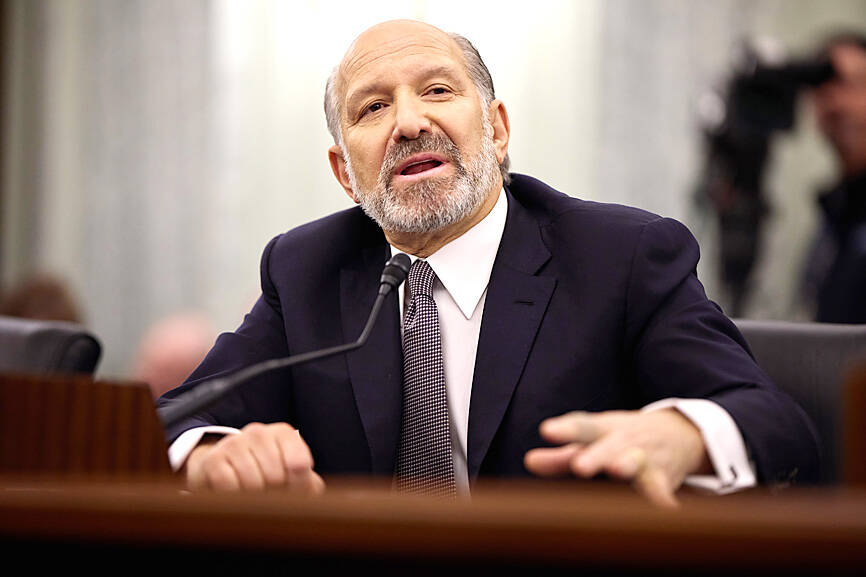US President Donald Trump’s pick to lead the agency in charge of a US$52 billion semiconductor subsidy program declined to give it unqualified support, raising questions about the disbursement of funds to companies like Intel Corp and Taiwan Semiconductor Manufacturing Co (台積電).
“I can’t say that I can honor something I haven’t read,” Howard Lutnick, Trump’s nominee for commerce secretary, said of the binding CHIPS and Science Act awards in a confirmation hearing on Wednesday. “To the extent monies have been disbursed, I would commit to rigorously enforcing documents that have been signed by those companies to make sure we get the benefit of the bargain.”
Still, Lutnick signaled a commitment to the program overall. He told senators that the CHIPS Act is an “excellent down payment” and repeatedly emphasized the importance of revitalizing US semiconductor manufacturing.

Photo: EPA-EFE
All told, his remarks indicate that the Trump administration will seek to put its own stamp on the initiative, but not unravel it entirely.
That could include attempts to remove environmental requirements or labor-friendly provisions, as some Republican lawmakers have already signaled an interest in doing.
The CHIPS Act set aside US$39 billion in grants for manufacturing projects — plus loans and tax breaks — to boost US chipmaking after decades of production shifting to Asia.
The program is one of the largest pieces of US industrial policy in more than a generation and was a major achievement of former US president Joe Biden’s administration.
Companies pledged to invest more than US$400 billion in response, including major new projects from Micron, Samsung Electronics Co and GlobalFoundries Inc. Those chipmakers are among the 20 companies that signed final contracts with the Biden administration — documents that industry and government officials generally viewed to be ironclad.
However, throughout negotiations, some companies worried that the language of their contracts gives Trump officials some room to make changes, Bloomberg has reported.
So far, just US$4.3 billion in manufacturing incentives has actually gone out the door. That is because companies will only receive money when they hit key construction and production benchmarks.
“As a structure, I think we need to get it right,” Lutnick said on Wednesday when asked about the awards. “I think we need to review them and get it right. But as the way the Congress has set it, it’s an excellent down payment in our ability to bring semiconductor manufacturing back to America.”
Lutnick also dismissed concerns about Trump’s proposed federal funding freeze causing delays for the CHIPS Act initiative. The program “has not really distributed much money, so the timing is not really impacted,” he said, adding that he is committed to “deliver efficiently and effectively the outcomes that you anticipated — or better.”

To many, Tatu City on the outskirts of Nairobi looks like a success. The first city entirely built by a private company to be operational in east Africa, with about 25,000 people living and working there, it accounts for about two-thirds of all foreign investment in Kenya. Its low-tax status has attracted more than 100 businesses including Heineken, coffee brand Dormans, and the biggest call-center and cold-chain transport firms in the region. However, to some local politicians, Tatu City has looked more like a target for extortion. A parade of governors have demanded land worth millions of dollars in exchange

An Indonesian animated movie is smashing regional box office records and could be set for wider success as it prepares to open beyond the Southeast Asian archipelago’s silver screens. Jumbo — a film based on the adventures of main character, Don, a large orphaned Indonesian boy facing bullying at school — last month became the highest-grossing Southeast Asian animated film, raking in more than US$8 million. Released at the end of March to coincide with the Eid holidays after the Islamic fasting month of Ramadan, the movie has hit 8 million ticket sales, the third-highest in Indonesian cinema history, Film

BIG BUCKS: Chairman Wei is expected to receive NT$34.12 million on a proposed NT$5 cash dividend plan, while the National Development Fund would get NT$8.27 billion Taiwan Semiconductor Manufacturing Co (TSMC, 台積電), the world’s largest contract chipmaker, yesterday announced that its board of directors approved US$15.25 billion in capital appropriations for long-term expansion to meet growing demand. The funds are to be used for installing advanced technology and packaging capacity, expanding mature and specialty technology, and constructing fabs with facility systems, TSMC said in a statement. The board also approved a proposal to distribute a NT$5 cash dividend per share, based on first-quarter earnings per share of NT$13.94, it said. That surpasses the NT$4.50 dividend for the fourth quarter of last year. TSMC has said that while it is eager

‘IMMENSE SWAY’: The top 50 companies, based on market cap, shape everything from technology to consumer trends, advisory firm Visual Capitalist said Taiwan Semiconductor Manufacturing Co (TSMC, 台積電) was ranked the 10th-most valuable company globally this year, market information advisory firm Visual Capitalist said. TSMC sat on a market cap of about US$915 billion as of Monday last week, making it the 10th-most valuable company in the world and No. 1 in Asia, the publisher said in its “50 Most Valuable Companies in the World” list. Visual Capitalist described TSMC as the world’s largest dedicated semiconductor foundry operator that rolls out chips for major tech names such as US consumer electronics brand Apple Inc, and artificial intelligence (AI) chip designers Nvidia Corp and Advanced